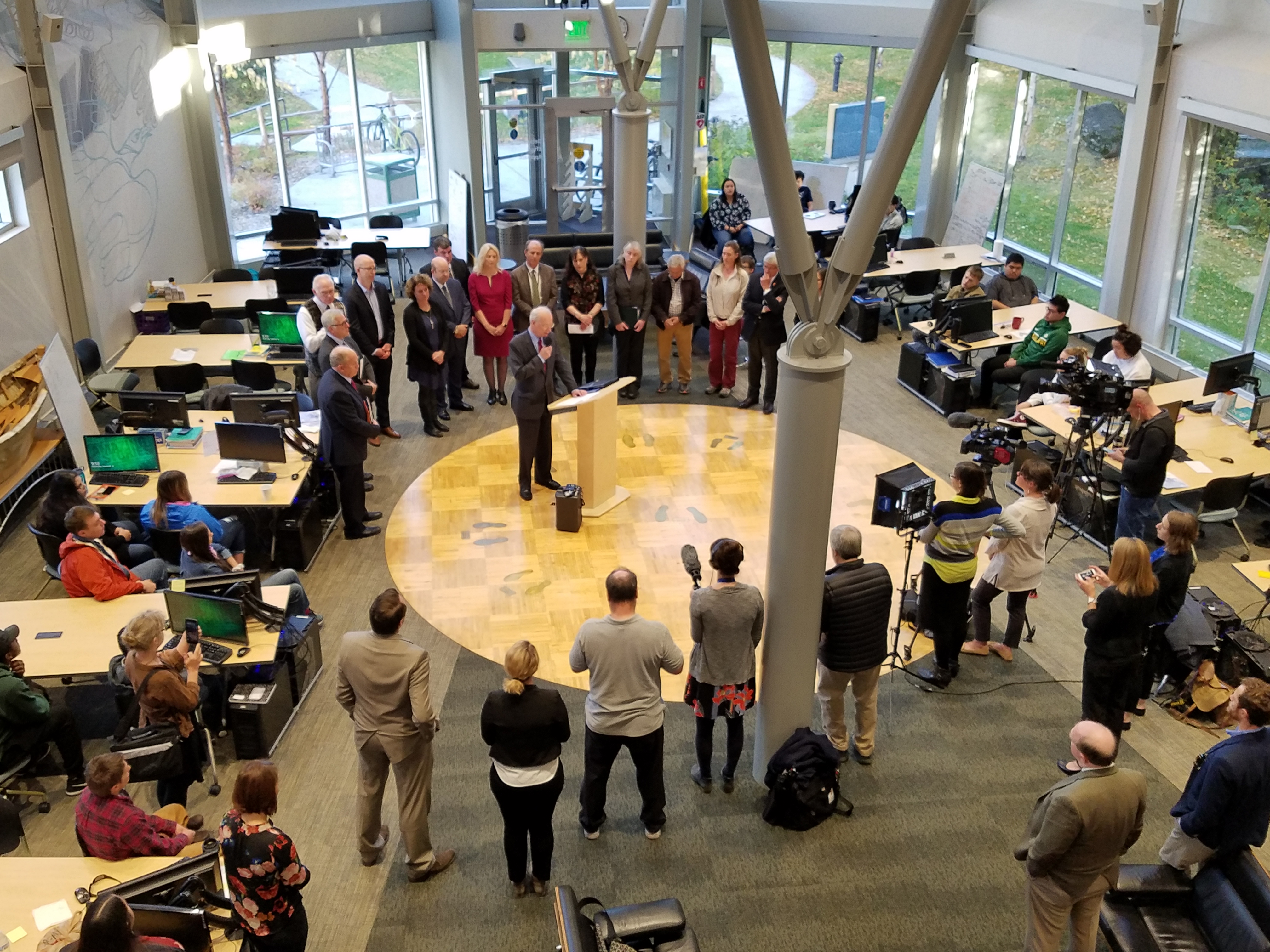Alaska climate team’s plan seeks to fill void left by federal government
The plans recommendations included a controversial carbon-pricing proposal, which Gov. Bill Walker did not endorse.

A comprehensive Alaska climate action plan released Wednesday calls for cuts in overall carbon emissions, expansion of renewable energy, targeted aid to imperiled villages and other policies to respond to and mitigate the changes caused by a warming climate.
The 40-page action plan and a broader policy statement were crafted over the past year by the Climate Action for Alaska Leadership Team, a 21-member panel established through an executive order issued by Gov. Bill Walker and chaired by Lt. Gov. Byron Mallott.
The action plan shows that Alaska is addressing climate change even as the Trump administration drops out of climate work, Walker said at a ceremony held at the University of Alaska Anchorage.
“The message is we don’t need to wait for somebody else to do something before we act,” Walker said.
Mallott said Alaska — like other states and institutions — is stepping into “space that has been essentially vacated by the federal government.”
“The international effort across the globe is hugely important. Alaska needs to do its part, not just for the people of Alaska but for generations yet to come,” Mallott said.
Alaska’s climate work has special significance because of Alaska’s Arctic location, he added. “The Arctic is a very compelling both laboratory and real-world example of what we need to do globally,” he said.
Although Alaska, like the rest of the far north, is hit by amplified climate warming and related problems, it is also dependent on oil production, a dilemma that Walker admitted requires a delicate balance.
The climate team’s action plan includes several recommendations for changes in oil industry operations. The plan supports the marketing of North Slope’s vast reserves of natural gas to be used as a lower-emissions bridge fuel, but it also calls for tighter controls on methane leaks in oil and gas fields on the North Slope and in Cook Inlet. The state emphasis on identifying and controlling such “fugitive emissions” comes as the Trump administration axes Obama-era restrictions on oil and gas operators’ methane emissions.
The climate team’s recommendations also include adoption of some type of carbon-pricing system, with special emphasis on a fee-and-dividend scheme that would reward people with lower emissions.
That was a controversial proposal, the subject of intense debate in the team’s meetings. At Wednesday’s event, Walker declined to endorse it.
“I’m not interested in anything that’s going to increase the cost of energy to Alaskans,” he said. “We’re the most energy-rich state in the nation. We should have the lowest-cost energy.”
Other recommendations point to potential new economic opportunities, including the possibility of generating revenues through carbon sequestration in Alaska’s forests and wetlands.
Still, much of the team’s action plan is expected to result in specific legislation or administrative action, Walker said.
He is confident that will be the case, he said, no matter who wins the upcoming gubernatorial election.
“Whoever’s in this office and takes the time to look at take a lot at what’s happening in this state. . .we are at ground zero,” he said. “You cannot step over this issue. It is right in front of us.”
Walker, an independent is running for re-election. One of his main opponents, Democrat Mark Begich, considers climate change a serious problem for Alaska. But Walker’s other main opponent, Republican Mike Dunleavy, opposes Alaska action on climate change — arguing that Alaska’s contribution is too small to be significant — and has criticized the governor for his focus on the subject.
At the same time the state climate team was completing its reports, Alaska’s largest city launched its own climate project. The Anchorage Climate Action Plan, which was supported with a resolution passed unanimously by the municipality’s assembly, will focus on reductions in emissions and study of expected climate impacts in the city.